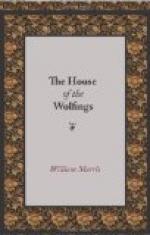Nor yet shall the Wolfing women hear words on the wind go by
As they weave and spin the night down when the House is gone to the
war,
And weep for the swains they wedded and the children that they bore.
Yea do my bidding, O Folk-wolf, lest a grief of the Gods should weigh
On the ancient House of the Wolfings and my death o’ercloud its day.”
And still she clung about him, while he spake no word of yea or nay: but at the last he let himself glide wholly into her arms, and the dwarf-wrought hauberk fell from his knees and lay on the grass.
So they abode together in that wood-lawn till the twilight was long gone, and the sun arisen for some while. And when Thiodolf stepped out of the beech-wood into the broad sunshine dappled with the shadow of the leaves of the hazels moving gently in the fresh morning air, he was covered from the neck to the knee by a hauberk of rings dark and grey and gleaming, fashioned by the dwarfs of ancient days.
CHAPTER IV—THE HOUSE FARETH TO THE WAR
Now when Thiodolf came back to the habitations of the kindred the whole House was astir, both thrall-men and women, and free women hurrying from cot to stithy, and from stithy to hall bearing the last of the war-gear or raiment for the fighting-men. But they for their part were some standing about anigh the Man’s-door, some sitting gravely within the hall, some watching the hurry of the thralls and women from the midmost of the open space amidst of the habitations, whereon there stood yet certain wains which were belated: for the most of the wains were now standing with the oxen already yoked to them down in the meadow past the acres, encircled by a confused throng of kine and horses and thrall-folk, for thither had all the beasts for the slaughter, and the horses for the warriors been brought; and there were the horses tethered or held by the thralls; some indeed were already saddled and bridled, and on others were the thralls doing the harness.
But as for the wains of the Markmen, they were stoutly framed of ash-tree with panels of aspen, and they were broad-wheeled so that they might go over rough and smooth. They had high tilts over them well framed of willow-poles covered over with squares of black felt over-lapping like shingles; which felt they made of the rough of their fleeces, for they had many sheep. And these wains were to them for houses upon the way if need were, and therein as now were stored their meal and their war-store and after fight they would flit their wounded men in them, such as were too sorely hurt to back a horse: nor must it be hidden that whiles they looked to bring back with them the treasure of the south. Moreover the folk if they were worsted in any battle, instead of fleeing without more done, would often draw back fighting into a garth made by these wains, and guarded by some of their thralls; and there would abide the onset of those who had thrust them back in the field. And this garth they called the Wain-burg.




